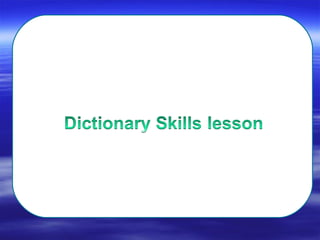Dictionary lesson
•Download as PPT, PDF•
1 like•1,128 views
How to search words in a dictionary
Report
Share
Report
Share

Recommended
More Related Content
What's hot
What's hot (20)
Words sentences and dictionaryes by:Diana Villarreal

Words sentences and dictionaryes by:Diana Villarreal
Viewers also liked
Viewers also liked (10)
Similar to Dictionary lesson
Similar to Dictionary lesson (20)
More from NoeliaRG
More from NoeliaRG (20)
Recently uploaded
https://app.box.com/s/7hlvjxjalkrik7fb082xx3jk7xd7liz3TỔNG ÔN TẬP THI VÀO LỚP 10 MÔN TIẾNG ANH NĂM HỌC 2023 - 2024 CÓ ĐÁP ÁN (NGỮ Â...

TỔNG ÔN TẬP THI VÀO LỚP 10 MÔN TIẾNG ANH NĂM HỌC 2023 - 2024 CÓ ĐÁP ÁN (NGỮ Â...Nguyen Thanh Tu Collection
Recently uploaded (20)
Interdisciplinary_Insights_Data_Collection_Methods.pptx

Interdisciplinary_Insights_Data_Collection_Methods.pptx
HMCS Max Bernays Pre-Deployment Brief (May 2024).pptx

HMCS Max Bernays Pre-Deployment Brief (May 2024).pptx
This PowerPoint helps students to consider the concept of infinity.

This PowerPoint helps students to consider the concept of infinity.
Beyond_Borders_Understanding_Anime_and_Manga_Fandom_A_Comprehensive_Audience_...

Beyond_Borders_Understanding_Anime_and_Manga_Fandom_A_Comprehensive_Audience_...
On National Teacher Day, meet the 2024-25 Kenan Fellows

On National Teacher Day, meet the 2024-25 Kenan Fellows
Kodo Millet PPT made by Ghanshyam bairwa college of Agriculture kumher bhara...

Kodo Millet PPT made by Ghanshyam bairwa college of Agriculture kumher bhara...
TỔNG ÔN TẬP THI VÀO LỚP 10 MÔN TIẾNG ANH NĂM HỌC 2023 - 2024 CÓ ĐÁP ÁN (NGỮ Â...

TỔNG ÔN TẬP THI VÀO LỚP 10 MÔN TIẾNG ANH NĂM HỌC 2023 - 2024 CÓ ĐÁP ÁN (NGỮ Â...
Unit-V; Pricing (Pharma Marketing Management).pptx

Unit-V; Pricing (Pharma Marketing Management).pptx
Salient Features of India constitution especially power and functions

Salient Features of India constitution especially power and functions
Fostering Friendships - Enhancing Social Bonds in the Classroom

Fostering Friendships - Enhancing Social Bonds in the Classroom
Dictionary lesson
- 3. Masculine – el / un Feminine – la / una A noun is an object or a thing, which can usually be preceded by ‘a’ or ‘the’ in English. E.g. Dog, Table, Bottle. Bear in mind that in the language you are studying, the word for ‘a’/’the’ depends on the gender. You can recognise these in a dictionary by the letter ‘ n ’...and in most dictionaries a m / f (/ n ) will tell you if its gender
- 4. ..un gat o negr o mi herman a es alt a Las matemáticas son interesant es An adjective is a word which describes a noun. E.g. A short story, the friendly doctor, the wooden table. Remember, in a foreign language, you may have to change the endings depending on the gender of a word. You can recognise these in a dictionary by the letters ‘ adj ’...
- 5. Most verbs in Spanish end in er / ir / ar e.g. habl ar , com er , sent ir A verb is a doing or action word. E.g. do, went, will, to eat. Verbs that are in the main section of the dictionary are in the infinitive (in the form “to drink”/”to sing”) so if you find a verb in the Foreign Language, you will probably have to change the verb using the endings you have learnt in class. You can recognise these in a dictionary by the letters ‘v’/ ‘vt’ / ‘vi’...
- 6. Tip – many adverbs in Spanish end in - mente An adverb is something that complements a verb, giving details about how the action was done. E.g. slowly, punctually You can recognise these in a dictionary by the letters ‘adv’..
- 9. Possibly the most useful thing about the grammar section of the dictionary are the verb tables. In some dictionaries, there is a list of verbs giving the page reference to look for. Present Indicative – actions which you are doing/or do regularly Imperfect – actions which used to happen / things which set the scene (in the past) Perfect – actions which are completed /which can be translated by “I have done/played” in English. The past participle is the ‘eaten’ / ‘done’ / ‘played’ Future – actions which you are going to do in the future / which will happen in the future Conditional – things which would happen if something else occurs e.g. I would go to the dentist if I had toothache.